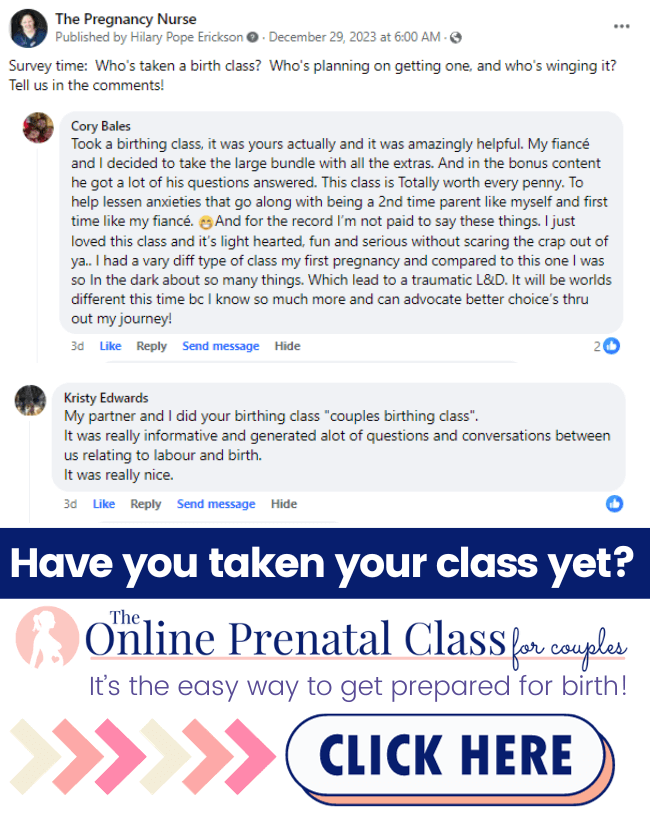👋 I’m so glad YOU are here. Are you looking to also get your partner prepared? This is for BOTH of you. Couples just love it and I know you want to both feel prepared!
Many of us feel like a certain action has a certain amount of pain associated with it. You break your finger, that’s a 7 on the pain scale — but labor does seem to look different — where some people say they have a “painless” birth and others are “dying” with early contractions. Why does everyone feel it differently? Let’s explore it.

Before we get started, let me remind you that pain is something that can be managed in the hospital. There are a few different options and I share them here:
Ok, but why do I think certain people feel things differently — let’s explore it together.
Pain Tolerance
Let me say that I don’t believe in pain tolerance. I hear a lot that someone has a “really high pain tolerance” only to see with my own two eyes that they don’t. Maybe they do have a high pain tolerance when they run, or break a bone — but labor pain is different.
As a nurse who’s seen a lot of people in different types of pain, including broken bones, dying, birth and more — not everyone experiences any type of pain the same.
So, we all experience different types of pain in different ways. That’s it, end of story.
Whether it’s a broken finger, a broken heart, or an appendicitis — we’re all different.
Also, people outwardly show pain in VERY different ways.
Some are noisy, and swear with every movement. Some are quiet and keep it all inside. Honestly, there’s no “right” way to experience pain — but it’s important to let your providers what you are experiencing. It doesn’t do anyone any help when we ask you your pain scale and you say none and it’s excruciating — it’s not helping anyone.
You have to remember we can only hear about people’s pain — so we have to take them at whatever they say. I’ve heard moms tell family their birth was “so painless” — but I wouldn’t have described their birth that way. Everyone gets to share their own perception, most often AFTER the event!
Want to know more about birth pain? — check out these posts:
- 4 Things to Know About Birth Pains
- Is an Induction More Painful than “Regular Labor”
- Fun Ways to Use the F-Bomb in Labor.
- Can I Be Induced at 37 Weeks Due to Pain
- What Does Round Ligament Pain Feel Like
Your Past
The reality is that birth (and frankly, the hospital) brings up a lot of feels.
It could be previous trauma, other medical things.
I always appreciate it when people tell me as much as they are willing about what this is stirring up within them.
You might be embarrassed to tell me:
- You’ve had previous abuse in that area that is making all of this worse
- You’ve seen or had horrible things done at the hospital and that is making all of this worse
But there isn’t any reason to feel that way. The more we know about you, what helps you feel safe and seen the more we want to do that.
The more you let your partner/support person know what you’re thinking the better it can be too — this isn’t a time to keep secrets, the more they know they can help more too!
The crazy thing about patients is that one person will really like it when we limit vaginal exams, and someone else wants to know what’s going on with their body to feel in control. And you really just can’t see it from their point of view — you think that EVERYONE wants it that way.
But, everyone’s different, and we want to help.
You may feel silly, but the more specific, the more helpful!
Example: Is it just seeing the IV in your arm that is killing you (maybe because your dad had an IV in his arm when he died), we can work to cover it up, or saline lock it if that’s an option!
Your Future
I call birth like a wedding and a major medical event happening simultaneously.
Meaning, your life, from that moment, will be different — and your body is also going through SO much (we shouldn’t forget this truly IS a major medical event — even if we sort of pretend that it isn’t).
With birth comes a lot of that stress about the future.
Is your partner going to be what you need as a co-parent and helping you to recover?
Will the baby (and you) be OK after birth?
There is a lot of unknowns.
And once again — the more you can tell us what’s worrying you, we can discuss it and we may even have things that can help you feel better.
We can ALSO tell you those important things to watch for postpartum to help you stay safe. That’s so important — and if you want to know them in advance come join me in Postpartum Care Made Easy.
Much like a wedding we spend a LOT of time preparing for the “event” and not so much thinking about what life will be like with that spouse after…
Also, none of us can tell the future, and I think hope helps a lot. It gets me through many a day as a parent, and I hope it can help you too. Positive affirmations help me do that…
Different Neurons
I’m here, with my almost 30 years of experience with patients, to say that some people just have different neurons.
I had a patient (and I’m talking ONE patient in 20 years) who literally felt “mild cramps” at 10 cm dilated.
She hadn’t prepared anything special and was even open to an epidural but she really just didn’t feel much. Honestly, it was real freaky to me to have a patient where I’m saying “you’re complete” and they’re like “huh — that’s so weird” in a 100% calm voice.
And then came the after birth pains.
She started screaming like we were pulling her arms off.
I ended up giving her pain medication after baby was born.
Why did this happen?
I have no idea, but I really think different people have different neurons. Some have extra in some places, and some have less — and I don’t know how that all works but I just think it after seeing people in pain sine 1997.
We can NEVER judge how someone else is reacting to pain. We have no idea what’s going on behind the scenes. In addition to different neurons I also think these things play a part….
A reminder that for MANY years we’ve been told that women don’t feel anything on their cervix, only to now notice that thousands of women have suffered with the IUD placement. Personally, I didn’t feel it much at all (after having 3 babies) but I know a lot of women feel it a LOT. We’re all different, and the beauty of medicine is that we can treat each person with what they need!
Different Situations
There’s a lot that plays in to labor pain.
One of the biggest one is baby’s position. If baby is OP a lot of times people have excruciating back pain that doesn’t go away until baby turns.
It can also be your pelvic floor, how quickly things are progressing, baby’s size, any issues with your cervix or uterus.
All of those things can change how you feel labor — even if it’s the exact same labor that someone else is experiencing.
We can’t judge labor pains, we can’t judge pain in general — is that clear enough yet (this is also one of the very early lessons you learn as a nurse — that patient’s rate their pain scale on their own).
Right as I wrote that bit about the pain scale I was very aware that sometimes I’d have someone come-in with their pain a 10 on the pain scale, and I would tell them that it was going to get worse, and they might have to adjust their pain scale — it’s not very nice, but true. I was glad to know that they were in that much pain, but I also needed them to know they were early in things…. and things were very likely to get worse.
Different Labors
While the studies don’t really point to the fact that inductions are more painful — I am here to say they are often longer, and there are parts of it that can feel absolutely extra miserable.
What I do know is that normally oxytocin has a bit of a “love” effect on us when it’s made in our brains, but when we pump it in through the IV it doesn’t have that same effect because it can’t reach our brains (due to the blood brain barrier). I think that early labor, especially, can be just much more miserable (and boring) with an induction.
Plus, you’re in the hospital the whole time — without the comforts of your people, your things, and your foods.
Want to know more about inductions? — check out these posts:
- Pumping To Induce Labor? Will it work?
- 5 Things NOT to do Before Your Induction
- Pitocin to Induce Labor
- Inducing Labor at 39 Weeks: Pros and Cons
- What to Expect at A Foley Bulb Induction
Preparation
Being scared can be a huge amount of the pain — and there’s lots of reasons that people might be scared….
- Where the pain is going from here
- How baby comes out (you’d be shocked by how many people have just NO idea what’s going to happen at birth)
- Not loving their provider (and concerned they’ll be “pushed” into something they don’t want)
- How to put on the hospital gown
You guys might laugh at the last one but there is just a LOT in the hospital that can be intimidating and a bit scary.
In my last hospital we had the weirdest faucets and people couldn’t figure out how to turn them on. I always felt so bad because I knew it was just one more thing that felt crazy about what was going on. When I remembered I tried to let them know how to turn it on in advance.
A lot of labor is like that. Personally, I had no idea how scary it would be when my baby’s heart rate went down, how hard they might pull with forceps and how tough my recovery would be.
I took a birth class that didn’t prepare me for any of that, unfortunately.
The good news, is there are a LOT of birth class options anymore. The foundation you will get in here will be a game changer for feeling prepared in the labor room — check out the glowing reviews on that page. I’m so glad that we have resources like that for parents to feel more confident in their birth.
When birth is less scary, it hurts less. Plus, in that class there’s a whole bonus video on natural pain management options as well as medical pain management options should you need them. You’re prepared for ALL of it (including inductions or cesareans) — because the truth is no one can predict what type of birth you’ll have — and being prepared makes your birth better. Get started today!
What did you learn about birth pain in this post? I’d love it if you told me in the comments. Hopefully it helps you to know that everyone is different, and that’s OK!







 Avoid Tearing at Delivery: 3 things you can do.
Avoid Tearing at Delivery: 3 things you can do.
